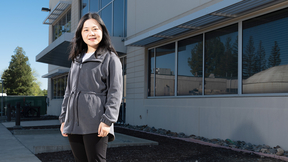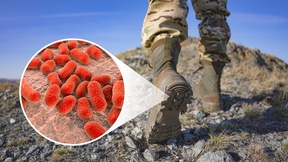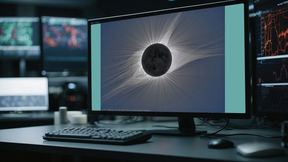Research award named after late LLNL scientist
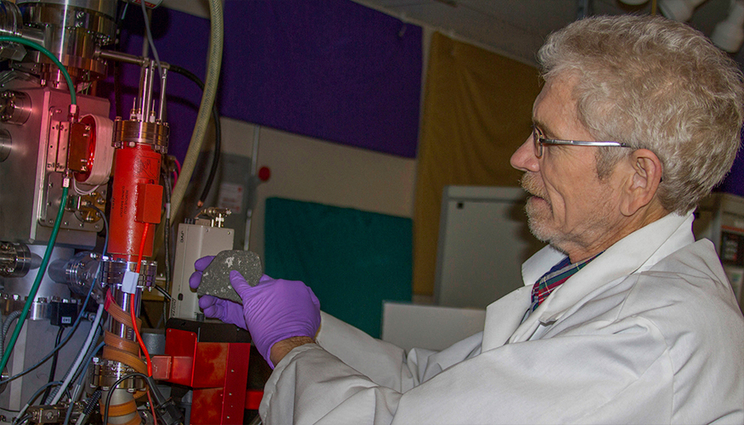 (Download Image)
Ian Hutcheon examines a piece of the meteorite Allende, which contains some of the oldest objects in the solar system. A new fellowship award has been established in honor of the late Hutcheon, who significantly advanced America’s nuclear forensics capability. Photo by Julie Russell/LLNL
(Download Image)
Ian Hutcheon examines a piece of the meteorite Allende, which contains some of the oldest objects in the solar system. A new fellowship award has been established in honor of the late Hutcheon, who significantly advanced America’s nuclear forensics capability. Photo by Julie Russell/LLNL
The first Dr. Ian Hutcheon Post-Doctoral Fellowship award, to support research in nuclear forensics as part of the Department of Homeland Security (DHS) Domestic Nuclear Detection Office’s (DNDO) National Nuclear Forensics Expertise Development Program, has been established. The fellowship honors the late Hutcheon, who significantly advanced America’s nuclear forensics capability during his 22-year tenure.
The first award will be presented beginning in 2017, and will be open to new Ph.D. graduates and postdoctoral fellows at the national and defense laboratories supporting the development of the nation’s nuclear forensics capability.
"One of my highest priorities is to help lead the U.S. government efforts to grow and sustain the unique expertise required to execute the nation’s nuclear forensics mission," said DNDO Director Huban Gowadia. "Ian Hutcheon was truly a ‘founding father’ of the nuclear forensics community, and this fellowship is a wonderful way to honor his memory and his dedication to cultivating new talent."
Hutcheon was most recently the group leader of the Chemical and Isotopic Signatures Group in Nuclear and Chemical Sciences Division and deputy director of the Glenn Seaborg Institute, Physical and Life Sciences Directorate, at Lawrence Livermore National Laboratory. He passed away March 26.
Hutcheon came to the Lab in 1993, after 20 years as a senior research associate at the University of Chicago and Caltech, where he established his reputation as an expert in secondary ion mass spectroscopy and its application to the field of cosmochemistry.
Hutcheon made numerous contributions to the study of the isotopic composition of meteorites and what they reveal about the evolution of the early solar system. He also was a key developer of nuclear forensics as both a field of scientific investigation and a scientific discipline with significant applications to national security. He conducted groundbreaking work in the formation mechanisms of planets and meteorites, and subtle, diffusion transport processes in terrestrial and planetary melts, glasses and minerals; and conducted the first NanoSIMS-enabled studies of biological materials (NanoSIMS is a high resolution imaging mass spectrometer used to probe extremely small materials). He authored more than 200 papers and book chapters, and co-wrote the book "Nuclear Forensics Analysis" with colleagues Pat Grant and Ken Moody.
His awards in recent years included being named a Distinguished Member of Technical Staff at the Laboratory; receiving the PLS Outstanding Postdoc Mentor award in 2010; and having a newly discovered mineral in the Allende meteorite named in his honor, Hutcheonite.
In his 22 years at LLNL, Hutcheon built the Chemical and Isotopic Signatures Group from himself, two others and one secondary ion mass spectrometer, to a team of 38 (scientists, postdocs, graduate students and technicians), filling Bldg.151 with multiple mass spectrometry labs, a scanning electron microscope, other analytical equipment and sample prep labs. The breadth of study within the group covers time scale and processes of nucleosynthesis; formation and evolution of meteorites and planets; mineralogy and petrology of unequilibrated meteorites; sub-cellular imaging of biological samples and isotope tracing into cells of all types; environmental microbiology; and nuclear forensics and attribution. The academic excellence he absorbed as senior research associate at the University of Chicago and Caltech, in the previous 20 years of his career, burned bright and he tried to instill in his group the importance of doing great science and getting it out into the world through publications.
In recent years Hutcheon and members of his group were involved in establishing collaborations with colleagues at analytical facilities in South Africa, Canada, the United Kingdom and with the IAEA, to help encourage nuclear forensics efforts.
"LLNL is appreciative of DNDO for its formation of the Dr. Ian Hutcheon Post-Doctoral Fellowship," said Bruce Warner, principal assicate director the LLNL's Global Security principal directorate. "Ian was a powerful representative of LLNL’s commitment to supporting education and training in fields of science and technology important to national security, including nuclear forensics. LLNL is providing DNDO a signed copy of Hutcheon, Grant and Moody’s textbook, titled, 'Nuclear Forensic Analysis,' as an award for the first Dr. Ian Hutcheon Post-Doctoral Fellowship."
The National Nuclear Forensics Expertise Development Program is an interagency effort committed to developing and maintaining a robust workforce required to execute the nation’s nuclear forensics mission.
In close partnership with 11 national laboratories, the program has provided support to more than 300 students and faculty and 27 universities, revitalizing the once-ailing pipeline of nuclear forensic scientists.
Visit the Department of Homeland Security website for more information on the National Nuclear Forensics Expertise Development Program.
Contact
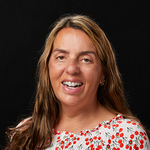 Anne M. Stark
Anne M. Stark
[email protected]
(925) 422-9799
Related Links
National Nuclear Forensics Expertise Development ProgramNuclear Forensic Analysis
Ian Hutcheon
Tags
NanoSIMSPhysical and Life Sciences
Featured Articles
